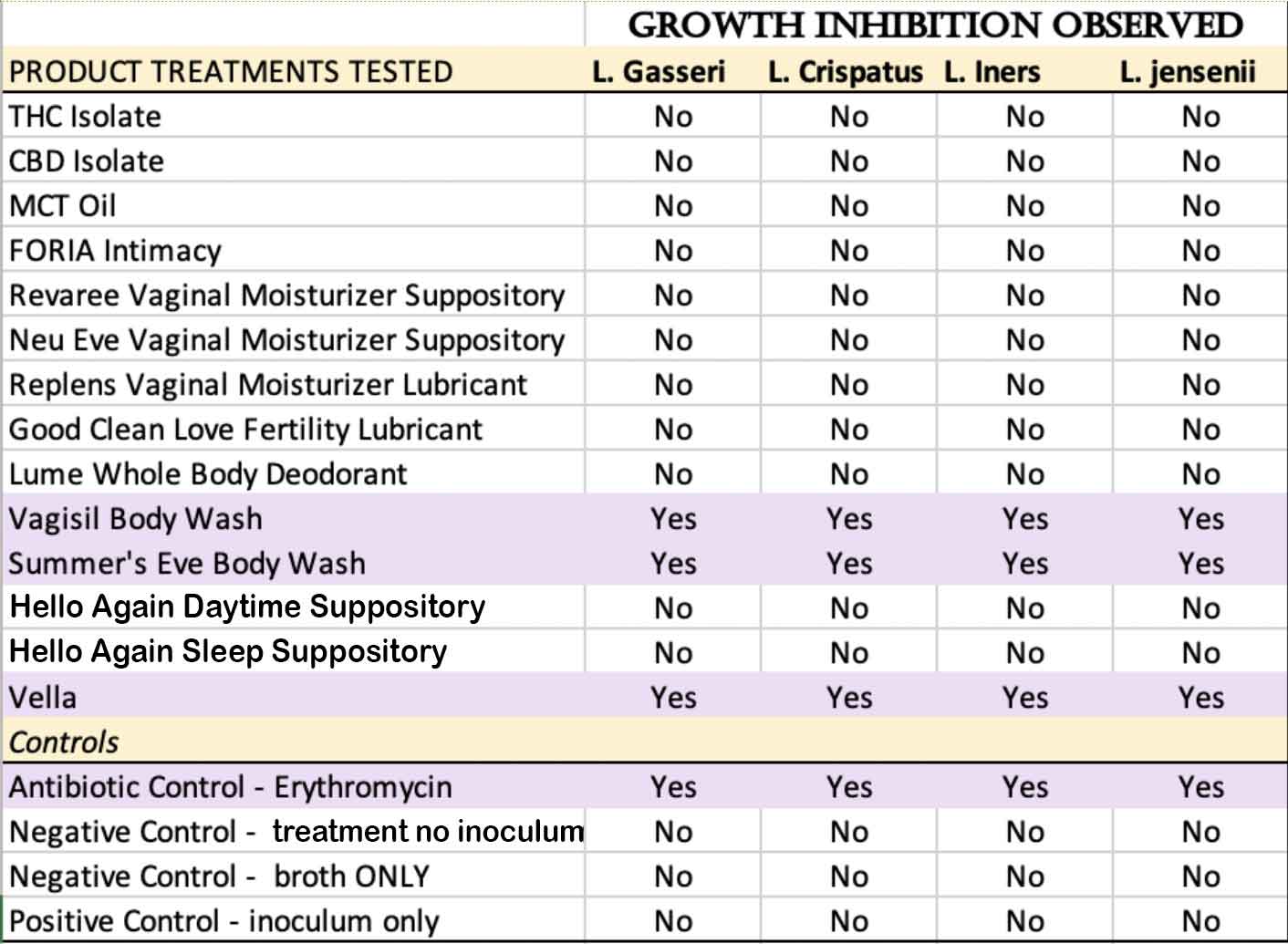Intimate Care Product Testing: Impacts on Healthy Lactobacilli
DOWNLOAD PDF copy of this fact sheet.
Why are we concerned?
New laboratory research has demonstrated that some intimate care products currently on the market can significantly inhibit the growth of lactobacilli, which are essential bacteria for a healthy vagina. The composition of bacteria which coat the walls of the vagina (often called the vaginal microbiome) are crucial to maintaining a healthy pH and preventing infections.The dominance of lactobacilli in the vaginal microbiome makes for the healthiest and most resilient condition to protect against infection.
The results raise concerns that vaginal exposure from the use of some intimate care products could adversely affect the lactobacilli balance. A lack of good lactobacilli balance can lead to significant health problems including bacterial vaginosis (BV), increased risk of sexually transmitted diseases, and fertility concerns. Of particular concern, is theimpact some of the tested products have on Lactobacillus iners, the dominant lactobacillus species in the vaginal microbiome of Black women. Due in part to targeted marketing tactics, Black women in the U.S. are more likely to useintimate care products than women of other races.
Lack of Regulation
Due to a lack of regulation, manufacturers are not required to test a product’s impact on the vaginal microbiome. Nor are they required to meet any universal standards of ingredient safety. This preliminary testing indicates that manufacturers need to take more responsibility of the impacts these products are having on people’s health.
Regulation is needed to require manufacturers to test intimate care products on the vaginal microbiome. There is a wide variety of intimate care products on the market, and because of a lack of testing and publicly available data we do not know which other products could be having this same effect. More research and testing of products are needed to assure that intimate care products are not harming our health.
What was done
Apothercare engaged with an independent cannabis testing laboratory, CLIP Labs, to develop an in vitro assay to evaluate the anti-microbial activity of eleven intimate care products. (The assay was done in the laboratory in test tubes and petri dishes and did not involve human or animal testing.) The products tested included lubricants, vaginal moisturizers, washes, deodorants, and vaginal suppositories, as well as cannabidiol (CBD) isolate and tetrahydrocannabidiol (THC) isolate since several of the products also included one or both cannabinoids. Specifically, CLIP Labs looked at whether products inhibited the growth of individual species of vaginal lactobacilli: Lactobacillus crispatus, Lactobacillus gasseri, Lactobacillus iners, and Lactobacillus Jensenii. Products tested included both popular brands that have been on the market for a long time, as well as newer products.
The following products were tested:
NeuEve Vaginal Moisturizer Suppositories
Lume Deodorant
Good Clean Love Bio-Genesis Fertility Lubricant
Replens Vaginal Moisturizer
Vagisil Scentsitive Scents Daily Intimate Wash (Peach Blossom)
Summer’s Eve Delicate Blossom Cleansing Wash
Revaree vaginal moisturizer suppository
Vella Women’s Pleasure Serum (CBD infused)
Foria intimate suppository (CBD infused)
Hello Again Everyday suppository (CBD/THC infused)
Hello Again Sleep Suppository (CBD/THC infused)
Results
Three of the eleven products (Vella, Vagisil and Summer’s Eve) resulted in inhibition of all species of lactobacilli, the other eight products had no effect. Neither the CBD nor THC isolates alone inhibited lactobacilli. Vagisil, particularly, had a greater impact on inhibiting Lactobacillus iners, compared to the other three types of lactobacilli. Lactobacillus iners is a type of lactobacillus more common to be dominant in Black women.
Conclusion
Intimate care products should promote health, not harm the vaginal microbiome. At the very least, products should not interfere with the growth of lactobacilli, which is crucial to a healthy vagina. It wasn’t very reassuring to find that three intimate care products currently on the market (Vella, Vagisil, and Summer’s Eve) can inhibit lactobacilli. Black women, who more commonly are users of intimate care products may be at greater risk from these products that specifically inhibit Lactobacillus iners, which is often dominant in the healthy vaginal microbiome of Black women.
Bacterial vaginosis, a condition marked by an imbalance of healthy vaginal bacteria, is unfortunately experienced by most women at some point in their lifetime. Far too often, people experiencing vaginal symptoms will attempt to self-treat with intimate care products like vaginal moisturizers and washes. It is concerning that intimate care products marketed as beneficial for health and hygiene, may be exacerbating the problem, by adversely affecting the vaginal microbiome.
Responsible manufacturers should be required to conduct testing to ensure their products do not affect the vaginal microbiome. It is still unknown which ingredients (or a combination thereof) in the mentioned products are responsible for the negative impact on lactobacilli. Initial testing indicated that neither CBD nor THC were responsible for the observed effect. There are many additives, including preservatives, fragrance, and fillers used in intimate care products that have never been tested for their impacts on the vaginal microbiome. There are numerous intimate care products that have also never been tested for these impacts.
For the benefit of health, there is a strong need for regulations requiring industry-wide safety standards to ensure that intimate care products are safe and healthy for sensitive vaginal tissue, starting with testing for impacts on beneficial lactobacilli.




